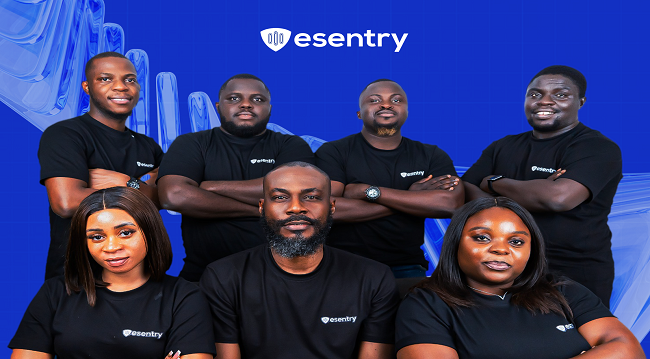E-Business
FG to Improve Data Protection, Citizen’s Privacy

Federal government has pledged its commitment to improve its capacity to protect the personal information, data and privacy of citizens, in line with global data regulations.

This has become necessary given the advancement of technology and digitization, which has given rise to cases of data breaches and privacy infringements of individuals and organizations.
Dr Vincent Olatunji, national commissioner/CEO, National Data Protection Commission (NDPC) made this known on Tuesday in Abuja, at a Digital Rights Innovation Lab meeting organised by Accountability Lab Nigeria in collaboration with, Spaces for Change, National Data Protection Commission, Paradigm Initiative Nigeria, and National Endowment for Democracy.
Represented by Chiderah Claire Ikeokonkwo, head of the Innovation Unit, Nigeria Data Protection Commission, NDPC, he noted that besides educating the public on the need to protect the value of information and content shared on online platforms of the government was also committed to deepening awareness, strengthening data protection mechanisms in order to instil trust and confidence.
He said: “Everything we do these days is connected to technology and as a result of that, we need to be able to have some control over the use, the access, what exactly is being done with this information that we exchange online.
“So, at the Nigeria data protection commission we regulate the processing of personal data, which means that we superintend over issues of data protection and privacy in all sectors of the economy and so in terms of work, the kind of work that we do with civil society organizations like accountability lab, it centres around stakeholder engagements.
“We also organize trainings you know, any form of capacity building just to make sure that we are doing something to positively increase the awareness on data protection and privacy in Nigeria and to also make sure that we’re building the number of experts on the issue of data protection and privacy.
“If people are aware of what happens when they are exchanging information online, then they will be better informed about how they can protect themselves online. Because most of these platforms are free of charge. It’s free to use and then we process your information, usually based on consent.
“You sign up to this app and you exchange the information. So, it then becomes necessary for citizens, data subjects, users, whatever you would call them, to be informed about data protection laws about their digital rights so that the more that they know about these rights the better they will be in a position to actually make sure that these rights are not being abused.
“So, it’s not a question of how safe are you. I think it’s more of how much you know and how much are you willing to do to protect the value of the information that you’re sharing online
Odeh Friday Odeh, country director, Accountability Lab, said there was a need for citizens to begin to manage information and have the confidence their digital rights and data were adequately protected
Odeh who urged the federal government to uphold the total rights and privacy of Nigerians, stressed the need for a balance in order to forestall incidences of hate speech, misinformation and disinformation among users in the digital space.
He said: “Just thinking what has happened over internet governance, interment shutdown in Africa and in the world, how can we as citizens have our rights protected, how can we ensure that the Government also stands for us?
“We want national unity but we need to build the foundation on truth. Look at what tools young people are using in terms of digital tools and how they can thrive in our society.
Information is key but nevertheless, we also have thought about the challenges that have to do with content, which go on a digital platform which causes disunity in some contexts, causes hate speech in some contexts as defined, but nevertheless, we need to create a balance.
“So we are bringing this platform together with government officials, civil society organizations working on digital rights and data protection, to see how we can form collaborative or collective actions to understand how we can provide solution.”
Mnenga Shiiwua, programme officer Accountability Lab, added, “We’re looking for an innovative opportunity where we’ll be able to sensitize people and create a collaborative approach towards pushing the understanding of the Nigerian data protection Act to the citizens to engage the relevant stakeholders, those from the civil society organizations and the governments at site, to see how together we can ensure the awareness about the Act is deepened and to see how together we can protect the rights of the citizens.”
E-Business
Kaspersky Discovers New Phishing Campaign Exploiting Google Tasks Notifications to Steal Corporate Credentials

Kaspersky has uncovered a new phishing scheme that abuses legitimate Google Tasks notifications to trick corporate users into revealing corporate login credentials.

By leveraging Google’s trusted @google.com email domain and notification system, attackers bypass traditional email security filters and exploit users’ trust in familiar services.
In this campaign, victims receive an authentic-looking notification from Google Tasks with the subject line “You have a new task.” The message creates the illusion that the recipient’s company has adopted Google’s task management tool, pressuring them to act quickly. The notification often includes elements of urgency, such as a high-priority flag and a tight deadline, to prompt the victim’s immediate response.
Upon clicking the embedded link, users are directed to a fraudulent form disguised as an “employee verification” page, where they are asked to enter their corporate credentials under the pretense of confirming their status. These stolen credentials can then be used for unauthorised access to company systems, data theft, or further attacks.
“Google’s vast ecosystem of services gets exploited by scammers. The scheme with Google Tasks is part of a broader trend observed before and continuing into 2026, where cybercriminals misuse legitimate platforms to distribute scams and phishing.
Notifications originating from legitimate domains naturally evade many spam and phishing filters, while the social engineering aspect – making it seem like an internal company process – lowers the victim’s guard,” comments Roman Dedenok, Anti-Spam Expert at Kaspersky.
E-Business
esentry 2025 Report Shows Healthcare, Financial Services and Telecoms as Staging Grounds for Increased Cyberattacks in Africa

Cyber adversaries targeting African organisations are increasingly shifting away from opportunistic attacks toward deliberate, sector-specific campaigns aimed at the continent’s most critical digital infrastructures, according to the esentry 2025 Annual Report released by esentry, Lagos-based Africa’s leading indigenous Managed Security Service Provider (MSSP).

The report identifies healthcare, financial services, and telecommunications as the primary staging grounds for high-velocity cyberattacks, reflecting a growing focus on sectors that underpin economic stability, public welfare, and digital connectivity across Africa.
The findings are drawn from one of the largest cybersecurity datasets analysed in the region. Over the course of 2025, esentry processed more than 31 billion security events, generating 3.5 million alerts and successfully blocking over 15,000 malicious attempts. This monitoring scale shows that, while traditional financial institutions remain a core target, the threat landscape has expanded to include digital lending platforms, healthcare systems that store sensitive personal data, and telecom operators responsible for national and regional connectivity.
Within the healthcare sector, the report highlights ransomware as the most acute risk, with attackers frequently exploiting exposed Remote Desktop Protocol (RDP) services to compromise patient data and disrupt essential medical operations. In financial services, organisations are facing a surge in credential abuse, insider-related threats, and info-stealer malware designed to enable fraud and unauthorised access. Telecommunications providers are increasingly targeted by highly tailored phishing campaigns and attacks on exposed web services, which aim to harvest credentials and compromise customer data.
Commenting on the findings, Gbolabo Awelewa, Chief Business Officer at esentry, said the nature of cyber threats across Africa has evolved significantly. “The threats we are seeing today are deliberate, informed, and carefully tailored to local enterprises. Attackers are exploiting trusted access and moving quietly within networks, which makes early detection critical. Our coordinated cybersecurity model, spanning Defence, Intelligence, Offence, and Security Engineering, allows us to combine scale, speed, and deep contextual insight to detect and neutralise threats before they escalate,” Awelewa said.
A defining trend identified in the report is the shift from overt system exploitation to the abuse of legitimate access. By leveraging compromised credentials and ‘living-off-the-land’ techniques, attackers can blend into routine enterprise operations and significantly delay detection. This approach has compressed the attack lifecycle, enabling adversaries to move from initial access to full operational impact in fewer than 15 days.
To counter this acceleration, the report emphasises the importance of early detection and automated response. esentry says it currently contains low-complexity incidents in under 90 seconds, using a combination of structured threat hunting and centralised telemetry to anticipate and absorb attacker pressure rather than reacting after damage has occurred.
As African organisations continue to digitise, the esentry 2025 Annual Report positions itself as a critical reference point for understanding the continent’s evolving cyber threat environment. The report concludes that protecting Africa’s digital trust will require a shift away from fragmented security tools toward disciplined, coordinated defence frameworks, what esentry describes as a unified Phalanx formation.
E-Business
AfDB, UNDP Launch $10Bn AI Initiative for Africa

The African Development Bank Group (AfDB) and the United Nations Development Programme (UNDP) have launched an ambitious $10 billion project to support the adoption of Artificial Intelligence (AI) across the continent.

The 10 Billion Initiative intends to accelerate ethical AI adoption and inclusive digital economic growth in Africa.
The initiative follows the Nairobi AI Forum, which took place earlier this month in Kenya and brought together governments, private sector leaders, development partners, and tech innovators to define pathways for impactful AI adoption.
According to the organisations, the strategy is a co-designed collaboration between the Bank Group, UNDP, and commercial partners that aims to raise up to $10 billion by 2035.
The resources will be used to create up to 40 million new jobs across the continent by 2035, through targeted investments that provide the groundwork for AI and accelerate widespread adoption in everything from entrepreneurship and regional data infrastructure to policy frameworks and skill development.
Nicholas Williams, AfDB Group ICT operations division manager, commented: “As a leading multilateral development institution, the bank is leveraging its comparative advantage to ensure Africa is not left behind in the AI era.
“The AI 10 Billion Initiative paves the way for expanded partnerships and sustained investments that will accelerate AI entrepreneurship, strengthen data and infrastructure ecosystems, and support inclusive growth across the continent.”

 General News3 days ago
General News3 days agoKPMG Strengthens Africa Leadership to Support Long‑term Growth Across the Continent

 E-Business3 days ago
E-Business3 days agoesentry 2025 Report Shows Healthcare, Financial Services and Telecoms as Staging Grounds for Increased Cyberattacks in Africa

 News2 days ago
News2 days agoNITDA Equips Federal Character Commission with Data Tools to Drive Public Sector Reform

 E-Financial2 days ago
E-Financial2 days agoHistory is Watching: Tinubu’s Moment to Rescue Nigeria’s Stolen Future

 Telecom2 days ago
Telecom2 days agoTelecom Giant MTN Injects N1.0 Trillion CAPEX into Network Expansion

 E-Financial3 days ago
E-Financial3 days agoFlutterwave Rises from Lagos Startup to Africa’s Fintech Powerhouse

 News3 days ago
News3 days agoNigeria, EU Ink Research, Innovation Deal Worth €100Bn

 General News3 days ago
General News3 days agoPalmPay Couples Show How Love Is Funded Digitally



























